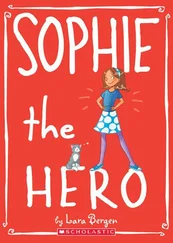Afterward, the three of them sat down at a picnic table and had a celebratory picnic of My Europe offerings. They kept talking and laughing, eating like pigs, protecting the food from the seagulls, protecting their napkins from the wind, smearing the sauces around. And all Sergey could think of was Vica. Here she was with her wild hair in the wind, sand all over her clothes, smiling at him, smiling at Eric, smiling at that stupid salami sandwich in her hand. Buoyant, victorious, half delirious with happiness.
I love her, he thought then. I really do.
He did love her, that much was clear. Whether they would be able to be happy together was a different question.
The staircase was dark as always and Sergey had trouble finding the keys to Goebbels’s door.
“Hey, there, Sergio,” Teena said, sticking her head out of her apartment. “Where’s my pal Enrico?”
“Eric,” Sergey said. “I promise to bring him next time.”
Eric loved feeding Goebbels, and Sergey would bring the boy with him from time to time. Teena had struck up a surprising friendship with Eric. They would play videogames in her room, building castles together, burning bridges, killing their enemies, and respawning their friends.
“Where’s your mom?” Sergey asked.
“On a date,” Teena said smugly.
“Oh.”
“Yeah, good for her. I made her sign up for Hello, Love! It’s not like she cares that you went back to your wife or anything.”
Goebbels meowed from behind the door and Sergey said good-bye to Teena and walked in. There he was, lying in the middle of the kitchen floor, flapping his tail against the tiles.
Sergey opened a can of minced duck delight, shaped the meat into tiny meatballs, and hid the anti-inflammatory pill inside one of them. That was Eric’s idea. He said that he did it all the time when he had to give medicine to Gavin’s cats. Then he confided to Sergey that his dream was to be a vet someday.
“But that’s so—” Sergey started to say “unambitious.” He stopped himself just in time. Let Eric figure out what he wants, he thought.
“Yeah, it’s tough, I know,” Eric said. “You have to have all As in biology, and Ms. Zeh keeps giving me Bs.”
Sergey put the meatballs into the bowl. Goebbels limped over to his food with great fervor. The medicinal piece was down (thank God) and now Goebbels was working on the remaining meatballs. He always turned his head sideways when he ate and that gave him a vicious expression, as if he was eating a live bird rather than the thoroughly processed minced duck delight.
Sergey’s phone beeped. There was a text message from Regina: “Is Vica with you?”
“No, why? Aren’t you meeting her at IKEA?” he typed.
“She’s not here and she’s not answering.”
“Must be on the subway,” Sergey texted back.
Regina sighed. She’d been waiting for Vica for twenty minutes on the crowded first floor of Brooklyn’s IKEA and she was getting restless. The place was awful, unbearable, loud, inspiring both agoraphobia because of its size and claustrophobia because of its crowded little pretend rooms. There were all these families moving in all directions half hidden behind the enormous boxes sticking out of their shopping carts. Angry, screaming, exhausted.
It was Vica’s idea to meet there. Regina had asked her if she knew a good place where she could look at children’s furniture and Vica said: “Are you kidding me? IKEA!” She offered to take Regina there and help her shop.
“Where are you?” Regina texted her again. Still no reply.
Ever since she returned to New York after three months in Moscow, Regina had been plagued by bouts of panic. She realized that during her time in Russia she was simply too busy — taking care of Nastya, handling the grueling adoption process — to feel anxious. Back home, between meetings with immigration lawyers, she had more free time to doubt the wisdom of her decision.
Regina had to rent an apartment in Moscow so that she could spend time with Nastya free of Aunt Masha’s supervision, but, of course, Aunt Masha dropped in for tea almost every day. Bob had spent the first three weeks with them. He was so good with Nastya that it intimidated Regina. Even though Nastya and he didn’t speak a common language, they seemed to communicate with ease, or at least with more ease than Nastya and Regina. Bob would play silly games with Nastya, take her on piggyback rides, or just run around a room on all fours and make animal sounds, making Nastya laugh and charming Aunt Masha. It got to the point where Regina was jealous. “She likes me better,” Bob said, “but I bet she’ll love you more.”
Still, she would have preferred it if Bob was as terrified as she was.
Then Bob went back to New York and Regina was left to figure out parenting on her own.
The amount of things she didn’t know about children was overwhelming. She had always been a serious reader, so in this situation too she turned to various self-help books on parenting and adoption. None of them helped; if anything, the books managed to intimidate her even further. There was only one book Regina could tolerate, and that was the Canadian novel Humdrum, the one she had just finished translating. Regina had reread it and was now hungrily waiting for the second one, which was supposed to come out later in the year. She found solace in the descriptions of the humdrum routine of caring for a child. There were so many urgent tasks described in the book that the reader didn’t have time to ponder the philosophy of mother’s love. Perhaps that was the philosophy of mother’s love — being so busy and concerned the whole time that you couldn’t possibly analyze it. Regina shared this thought with Inga, when Inga came over to meet Nastya, and Inga seemed to agree. She supported Regina’s decision to adopt, but Regina couldn’t help but notice that Inga thought there was something whimsical in it. As if Regina, who had always had such a charmed life, managed to find a fun and easy way to have a child too. Unlike Inga, who had her son in her sophomore year while in the university and had to work and study and care for the baby all at the same time!
As soon as Regina got back to the United States, she was attacked by swarms of people congratulating her on her “noble deed” or pushing their vague child-rearing ideas on her.
There was Becky, Bob’s daughter, hugging Regina and saying, “You can’t imagine how much I admire you for this.”
There was Regina’s dad, who said exactly the same thing and then started to cry.
There was Bob’s family, who insisted that she should baptize Nastya right away.
There were Laszlo and his wife, the proud parents of four children, who thought that she should model her parenting on their style.
There were Bob’s friends, who kept sending her links to books and articles on adoption and child-rearing.
There were distant acquaintances, who wouldn’t answer her very specific questions but would say instead that she had to listen to her heart and that her heart held all the answers. Well, guess what, her heart didn’t hold the answer to the question of whether American schools accepted Russian immunization records.
Sergey would just tell her an occasional useless fact like: “Eric used to drink from the bottle until he was four.”
And Vadik preferred to keep mum on the subject altogether.
Even Bob scared her! Regina couldn’t help but feel that he was expecting too much. “You’re gonna be a spectacular mother,” he would say, and she would panic and think: What if I fall short of spectacular?
Vica turned out to be the only one with whom it was easy to talk about motherhood. She was eager to share her parenting experience, but she never made Regina feel like an idiot. Her best advice came in the form of this sentence: “No matter what you do, you can be sure that you’re doing something wrong.” That actually made Regina feel relieved. Every parent was bound to screw up in one way or another. She would screw up too. But it would be okay.
Читать дальше












